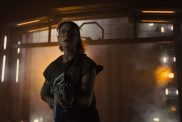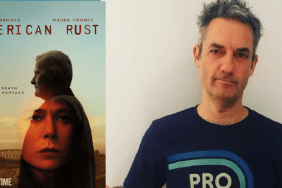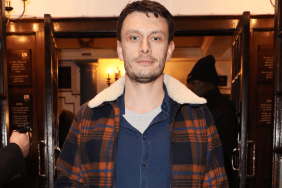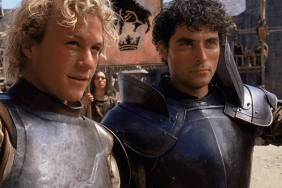“I’m not just another rabbit,” Charles Fleischer jokes at the tail-end of our interview.
It’s true. Even though he’s best known for voicing Roger Rabbit (as well as Benny the Cab and two of the weasels) in Robert Zemeckis’ 1988 neo-noir masterpiece Who Framed Roger Rabbit, Fleischer’s multihyphenate falls somewhere along the lines of actor-comic-scientist-inventor. While his most famous on-screen performance is now available for the first time on Blu-ray, curious fans can also check out his 2005 TED talk in the player at the bottom of this page, view the patent for a toy egg that he invented and, if you really want to feel like you should have been paying more attention in school, read his recent scientific paper, “Can Sequentially Linked Gamma-Ray Bursts Nullify Randomness?” on the Cornell University website.
In the below interview, Fleischer chats with ComingSoon.net about working with Zemeckis, the hope that a sequel could still happen and his decidedly in-depth research for the role (which, he says, took him as far back as the Big Bang itself).
CS: How did “Who Framed Roger Rabbit” begin for you?
Charles Fleischer: My involvement with “Roger Rabbit” began prior to my knowledge, because Bob Zemeckis, the director, saw me do my standup at a club here in Los Angeles. Years later, when they were looking for someone to play Eddie Valiant, they requested that I come in and read this character off-camera while they auditioned other actors. After several attempts at doing that, Bob asked me if I would participate as Roger Rabbit and go to England. I said, “Okay! I’ll do that!”
CS: That seems like something that’s very easy to say “yes” to.
Fleischer: Why, you’d have to be less than alive to say “no” to that. “I’ll just stay here and work at a car wash.” It was an easy yes.
CS: You’ve continued to work with Robert Zemeckis. Can you compare how his directing style has changed between “Roger Rabbit” and, say, “The Polar Express”?
Fleischer: “Polar Express” was, as you know, motion capture. In fact, they used my face as a model for a lot of the elves as well as that of Steven Tyler. Had I been paid as an extra, I would have made a lot more because there were literally thousands of versions of my face! It was motion capture and you’re wearing these crazy suits with little dots glued to your face. You’re not on a set, so to speak. It’s just a big hall. Doing “Roger Rabbit” was like doing a film. I was there, dressed as a rabbit and performing with Bob Hoskins off-camera, projecting myself into a space where he was interacting with a Roger Rabbit yet to be seen.
CS: How quickly did the voice come to you?
Fleischer: It was about 11 seconds, give or take a minute. Like anything, it was an evolution based on the script and reading to see who the character was on a spiritual and cellular soul level. Combining that with his visual appearance so that the voice would make sense. If he was a really small character, you wouldn’t buy a really deep voice. There had to be a hook up with what you see and what you see.

CS: You also did the voice of Benny the cab. If you were on set dressed up like a rabbit for Roger, what did playing Benny entail?
Fleischer: Benny was done after the principal photography. Originally, the late and great Lou Rawls was the voice of Benny. For some reason, they decided they wanted to make a change. Bob asked me and that was done strictly in the studio, as most voicings are. Because this was an interactive, live situation, it was necessary for me to be on the set as they recorded the video and the audio together. But I did the cab and also two of the weasels, Psycho and Greasy. I played four different characters.
CS: Because of the unique approach to animation, was there any room for improvisation?
Fleischer: Well, the improvisation could occur during rehearsal, but once you hit the point, you kind of lock it in. They have to do different angles, etc. Especially when you’re dealing with a live-action/animation combo situation. If I had an idea, I would present it to them. If they liked it, they would say yeah and if they didn’t, we’d move on. Working with Bob Zemeckis is just incredible. He’s an extraordinary artist and really a genius kind of a guy who’s a big kid. The enthusiasm that he brings to set every day is contagious and lends itself to the magic. I’d also like to point out that on the Blu-ray, it also includes the three shorts that were done.
CS: What has the interaction been like with fans over the years. Do you ever surprise people by launching into the voice?
Fleischer: I certainly will do it if someone asks me. I think if I just went around and did the voice, that might be sign that I need some form of psychological counseling. I don’t think that Dustin Hoffman shows up at the bus stop doing “Rain Man.” Like I say, I’m more than happy to provide anybody with that opportunity, but I don’t necessarily just walk around jumping onto it.
CS: But I would imagine that you come across a lot of kids that want to hear it.
Fleischer: Yeah, sure. When I’m doing stand-up comedy, especially — which I do all around the globe — people will ask me to do it and I do, certainly. It’s not a part of my regular standup act.
CS: Is Roger Rabbit a character that has resonated with you over the years?
Fleischer: Well, everything I do sticks with me depending on the reaction from the public. Certainly Roger has an adhesive quality that enhances the stickiness. It’s such a part of our memory and the whole subconscious situation where it’s a story that takes place in the ’40s. It gives you the sense that Roger has always been there. He blended right in with all the other characters. It was an amazing honor to be a participant in something of this magnitude.
CS: Robert Zemeckis has said that he’d like to do a sequel. Is there any update on that front?
Fleischer: I would say that the update is that there are rumors. Because I’m not an executive at Disney studios — or at least I wasn’t before this interview — the answer would fall outside my canon. If it were within my decision-making capacity, I would more than love to do more with Roger. I think there’s a lot of people that would, too and that leads me to believe that it could happen. If something happens once, it might happen again.

CS: What is a dream project at this point in your career?
Fleischer: A dream project is this interview, for me. A dream project is anything I do when I’m awake. I’m doing my standup. I’m working on getting a television show on. I have also recently completed a scientific paper I wrote regarding a discovery I made concerning something called gamma ray bursts, which was endorsed by a high-energy astrophysicist and is now on the Cornell University website. I also have a patent on an invention I invented, which sounds redundant. It’s a device that indicates the golden ration. There’s Moleeds, which I talk about in my TED talk. In addition to my comedic sensibilities, I also have a love of science. I think that it would be nice if, by the time we’re doing the next version of “Roger Rabbit,” it would be nice if I was receiving my Nobel prize the same week.
CS: What is the television show you’re working on?
Fleischer: At this point, I think it would be best to remain mysterious and just say that it will be funny and interesting and inventive.
CS: Because “Roger Rabbit” is, essentially, a period film, was there any sort of historical research that you had to do to prepare for the part?
Fleischer: Well, I studied the history of the world. I think anything that you do, you have a greater understanding of things that led up to it. Where do you stop at that process? Do you stop at the ’40s? You’ve gotta go back to the ’30s because the ’30s led to the ’40s. Essentially, you have to go back to the Big Bang. How did that happen? How did this universe begin with something smaller than an atom? I would suggest that, possibly, it was two other universes that created this one. Because of the cosmic microwave background radiation, we do know certain things about the Big Bang and how it occurred. I think it’s all linked. I think everything is connected. If you’re going to study the history of the ’40s, you have to go back to the first moment that we know about.
CS: That sounds like an awful lot of research.
Fleischer: (laughs) Are you kidding me? I don’t take this thing lightly… I’m not just another rabbit!
You can check out Fleischer’s 2005 TED talk in the player below:









